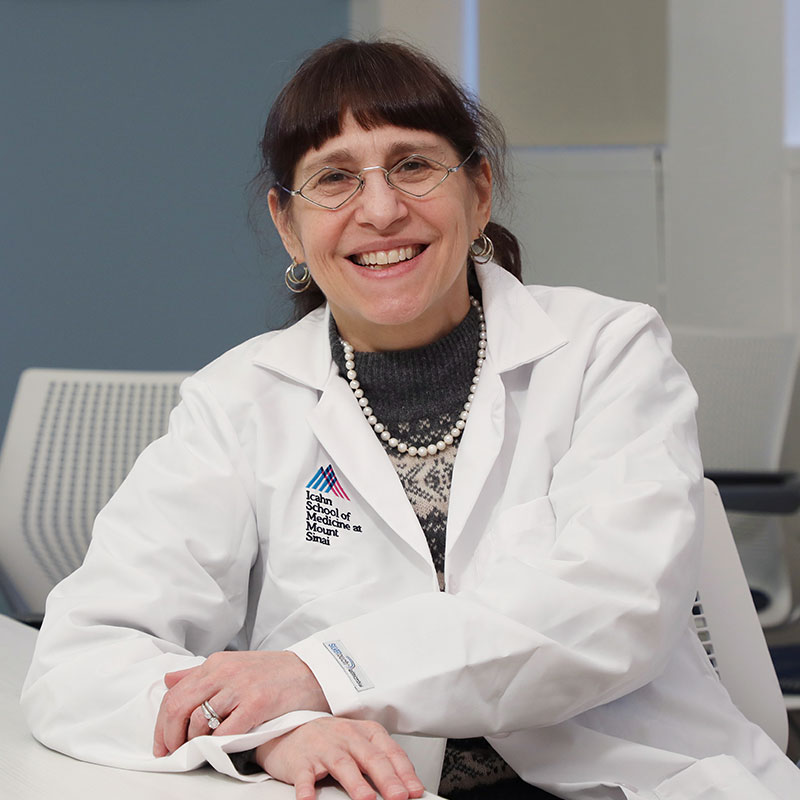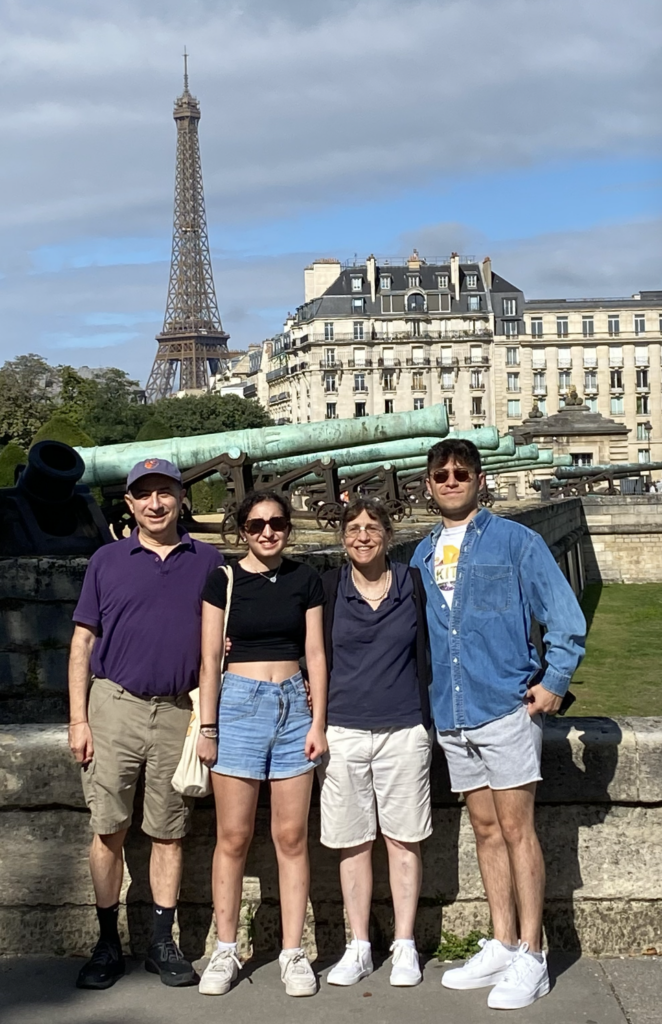
Sign up for a new account.
And get access to
The latest T1D content
Research that matters
Our daily questions
Sign up by entering your info below.
Reset Your Password
Don't worry.
We will email you instructions to reset your
password.
Carol Levy, MD, CDCES, is an Endocrinologist and Professor of Medicine in the Division of Endocrinology, Diabetes, and Bone Disease and is a Professor of Obstetrics, Gynecology, and Reproductive Science at Mount Sinai Health System in New York. Dr. Levy serves as Director of The Mount Sinai Diabetes Center and as Director of the Type 1 Diabetes Clinical Research and Artificial Pancreas Research Programs at Mount Sinai. In addition, Dr. Levy is the Associate System Chief for Clinical Research in the Division of Endocrinology.
Interview with Carol Levy, MD, CDCES
 In this interview, Levy discusses her expertise in supporting people with type 1 diabetes (T1D) and working to improve patient care through the T1D Exchange Quality Improvement Collaborative (T1DX-QI).
In this interview, Levy discusses her expertise in supporting people with type 1 diabetes (T1D) and working to improve patient care through the T1D Exchange Quality Improvement Collaborative (T1DX-QI).
The T1DX-QI was established in 2016 — with the support of The Leona M. and Harry B. Helmsley Charitable Trust — in an effort to refine best practices and improve daily life for people with type 1 diabetes (T1D). Growth has been tremendous, with 54 endocrine clinics from across the U.S. participating in the Collaborative.
Fueled by top leaders in diabetes care, the T1DX-QI has become an engine of innovation and inspiration. By engaging with the shared, data-driven, and systematic methods of the T1DX-QI, clinics have seen unprecedented success in their approach to diabetes management.
With members working closely together to identify gaps in care, discover and refine best practices, and share research — the process has become knowledge-sharing at its very best. While collated data gives clinics a clear sense of “where they are,” it also demonstrates “where they can be” by applying shared, evidence-based methods for improving care.
What led you to endocrinology?
“When I was seven years old, I was diagnosed with T1D by my dad,” shared Levy.
“There wasn’t much at one’s disposal to make a diabetes diagnosis in 1971. However, my dad, who is also a physician, put two-and-two together with my classic symptoms and markedly elevated urine glucose level,” explained Levy.
“Those were the stone ages of diabetes,” recollected Levy. “Back then, you basically took one shot of insulin a day, peed in a cup, and kept your fingers crossed — I can’t even imagine what went through my parents’ minds during that time.”
Throughout her childhood and young adult years, Levy managed T1D with rudimentary tools and insulin. As the years passed by, she decided to pursue a career in medicine herself.
“It was during college that I heard about a new device called a ‘glucose meter’, which is hard to believe when you think about where we are right now,” said Levy.
“In medical school, I was certain I’d specialize in infectious disease; it was an area I was very interested in, which required a lot of thinking. However, I ended up matching for residency at Deaconess Hospital in Boston, which ironically also happened to be the home of the Joslin Diabetes Center. This is where my story took an interesting turn,” explained Levy.
“As I was rounding during my second-year rotation, I had an epiphany and knew that endocrinology was what I was meant to do,” said Levy. “Florence Brown, who was one of my mentors at Joslin, became a role model for me in terms of helping women with diabetes in pregnancy. I carried her passion forward as I launched into my own medical career,” said Levy.
“While my road was a little bumpy getting here, my plan was always to become a clinician, educator, and researcher,” explained Levy, who cares for her patients with a profound sense of empathy and understanding.
T1D research with a focus on pregnancy
About 10 years ago, Levy set her sights on spearheading a diabetes research program at Mt. Sinai. After taking her ideas to the chief of her division, she was generously given two years to launch the program.
“I’ll be upfront. Some days I’m not sure how I pulled it off,” remembered Levy, who is incredibly humble, has a witty sense of humor, and an unmatched work ethic. “We’ve done a lot of great trials and have been on the cutting-edge of research with new diabetes technology — including pivotal trials leading to approval of glucose sensors, AID systems, Control IQ, and Omnipod 5. And treatments for T1D — including early studies evaluating SGLT2 inhibitors and GLP-1 agonists.”
As eye-opening as her research has been, Levy’s interest in studying and addressing disparities in diabetes and pregnancy remained a passion.
“While we’re full of functional tips and tools for diabetes in general, pregnancy and diabetes remain in ‘uncharted territories,’” said Levy.
“Being pregnant with diabetes can be an incredibly humbling experience — those were honestly some of the hardest years of my life. It certainly gives you perspective,” explained Levy, whose objective to improve the pregnancy experience for women with diabetes proved to be no small feat during the pandemic.
“At Sinai, we took part in glucose sensor accuracy and AID system studies with specific targets customized for pregnancy. We managed to do a study with 10 pregnant individuals in hotels — all wearing masks — while the world was besieged by COVID, and we watched 24/7 from our phones. This work was a labor of love, but I knew it had to be done.”
Levy and her collaborators recently shared the study results in the American Diabetes Association’s journal, Diabetes Care: At-Home Use of a Pregnancy-Specific Zone-MPC Closed-Loop System for Pregnancies Complicated by Type 1 Diabetes: A Single-Arm, Observational Multicenter Study.
The art of helping others
“As you can tell, I wear about twenty hats,” joked Levy, “To be perfectly upfront, if you ask people, they’re likely to say I go ‘above and beyond’ more than I probably should. Patients will say, ‘You always answer my messages quickly,’ and I say, ‘It’s sort of a problem because I too would want someone to answer my questions, so I try to get back with you promptly.’”
When asked how her delivery of care is impacted by the experiential intelligence she brings to the table, Levy laughed and responded, “That’s a great question — you should probably ask my husband and family about that.”
“I’ll just say that when I went into medicine, I decided that I wanted to be the physician I wanted to see,” added Levy. “While everyone approaches diabetes differently, I try to put myself in patients’ shoes, thinking about where they are, what their struggles are, and ways that I can help them with challenges and frustrations.”
“What works for me may not work for someone else, but I can at least bring some of my personal insights into care. Of course, that doesn’t mean that a provider without diabetes doesn’t have these insights, too. There are so many phenomenal endocrinologists — but this is my story.
T1DX-QI involvement
“I’ve been involved with T1DX-QI since 2020 — right when the pandemic began to unfold,” said Levy. “The passion and commitment of everyone involved is what drew me in. We gain strength in our numbers and learn an incredible amount from one another. It’s truly a collaborative effort, and that’s what is super exciting.”
The T1DX-QI team at Mt. Sinai includes four physicians with a strong interest in T1D diabetes and quality, a nurse practitioner — who lives with T1D, two registered dietitians, a project manager, a research coordinator, and a faculty member who is on the research track who also has an MPH.
“We have a team that really cares and wants to make a difference.”
Levy explained that T1DX-QI aligns with her personal goals: “To meet people where they are, come up with customized solutions that work for them, and be on the forefront to help people in need of these solutions.”
What do you enjoy most about your work?
 “What I enjoy most about my work is three-fold: Feeling like I’ve helped someone, educating and training new endocrinologists, and seeing our research findings come to fruition,” explained Levy.
“What I enjoy most about my work is three-fold: Feeling like I’ve helped someone, educating and training new endocrinologists, and seeing our research findings come to fruition,” explained Levy.
“That said, no matter what I do, patient outcomes will always come first. I couldn’t do one without the others. I’m passionate about contributing to all three, and I wouldn’t be happy doing just one of them.”
“Medicine is hard work, but the one thing I say when I leave work every day is — I know I’ve at least done one good thing to help one person, and that’s what keeps me going,” said Levy
Outside of work
When Dr. Levy isn’t behind her desk, you’ll likely find her reading a novel, exploring NYC’s ethnic restaurants, traveling, and spending time with her husband and two adult children.







